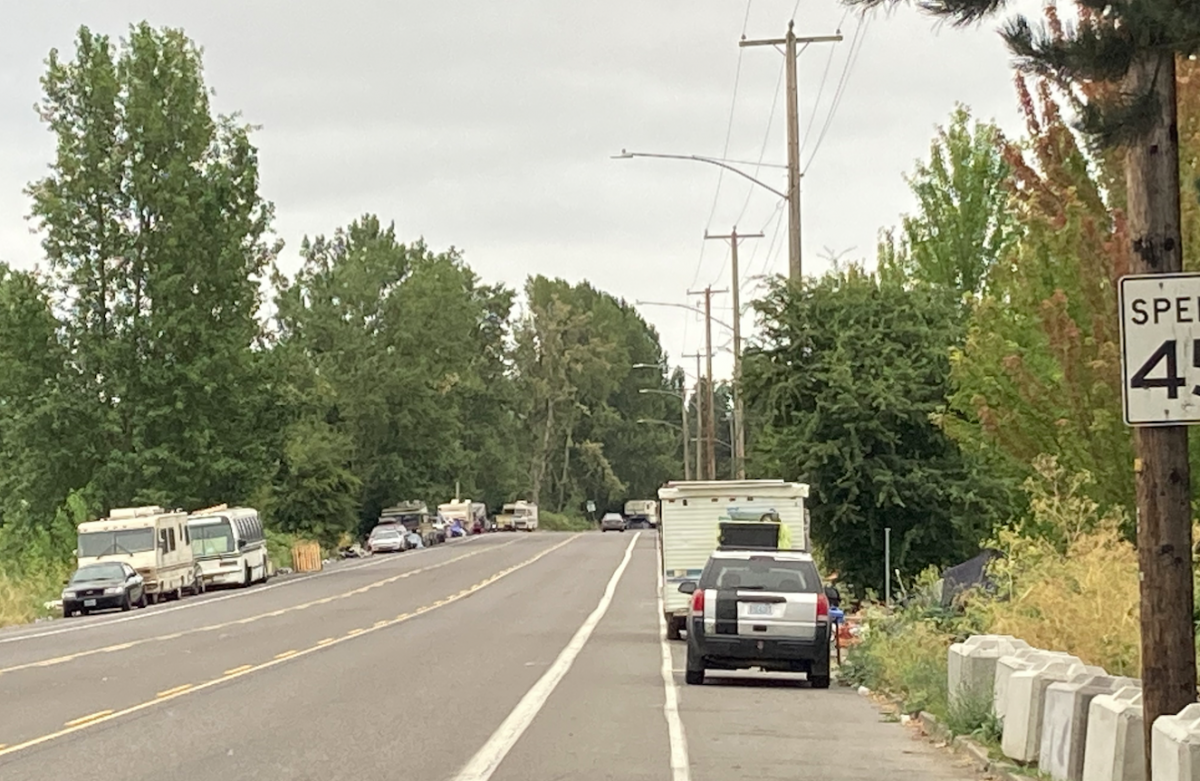
In response to BikePortland’s article yesterday about the early morning death of pedestrian Michael L. Bute on NE 33rd Drive, Portland attorney and safety advocate Scott Kocher commented that he had seen a large encampment of people in vehicles parked along NE 33rd Drive when he biked the road a couple of months ago.
Kocher told me that he was “horrified at the safety conditions,” and pointed out that the recent Oregon Walks report on pedestrian deaths found that “people experiencing houselessness are over ten times more likely to be killed as pedestrians than housed Portlanders.”
I visited NE 33rd Drive this morning and also saw a long line of cars and campers parked on both sides of the street, just south of where Bute was hit. The road is posted at 45 mph and the people who live here do not have a safe space to walk or cross the street. I observed a lot of truck traffic; standing on the side of the road did not feel safe to me. The camp had a portable toilet and the bike lanes appeared clear to me, although some residents had belongings right up to the line. I got the impression that residents were attempting to stay out of the lane.
Advertisement
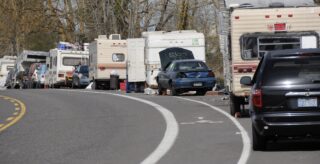
(Photo: J. Maus/BikePortland)
Kocher would like the Portland Bureau of Transportation to consider houseless Portlanders in its decisions about how streets should operate. According to Kocher, this particular area has enough residents that NE 33rd Drive should be classified as a collector in a residence district and posted at the required 20 mph. He also feels it is urgent to take away the center turn lane and use the additional width to create a safe walking space.
We don’t know that Michael Bute was connected to the encampment, he was struck about 150 yards north of it, in front of the Oregon Army National Guard building. [UPDATE: 7/7/21 5:18 PM] The Portland Police Bureau confirmed that the painted marks I saw in the street were part of their crash analysis, it appeared to me that Bute was crossing the street and that the car struck him while he was in the center turn lane. I didn’t notice any crosswalks nearby. The employees at the National Guard were unaware that a crash had occurred in front of their building over the holiday weekend.
(Scott Kocher is a financial supporter of BikePortland)

— Lisa Caballero, lisacaballero853@gmail.com
— Get our headlines delivered to your inbox.
— Support this independent community media outlet with a one-time contribution or monthly subscription.

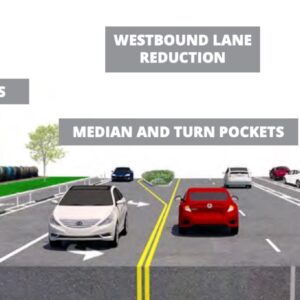
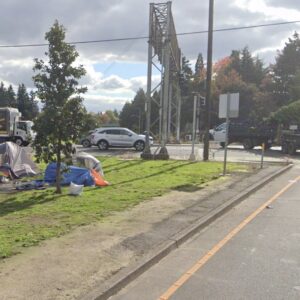

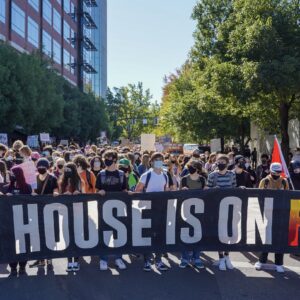
Thanks for reading.
BikePortland has served this community with independent community journalism since 2005. We rely on subscriptions from readers like you to survive. Your financial support is vital in keeping this valuable resource alive and well.
Please subscribe today to strengthen and expand our work.
Thank you for the reporting.
Thanks Lisa for following up on Scot’s initial comments per current conditions.
And for clarity: when I asked about the deceased’s proximity to the intersection of NE Sutherland and crosswalks …I was pointing out he may have been within a zone that could be considered as an “unmarked” crosswalk. I was not expecting / assuming it was a striped crosswalk (from what I saw on Google Maps and from past memory of cycling through there). And I am assuming this unmarked crossing(s) where NE Sutherland is not signed by PBoT’s engineers as a “no pedestrian crossing” etc.).
Also TRIMET does have bus service to this intersection area (RT 70 Stop ID: 11171) for the employment centers near by [and now the campers camp zone]…so “someone” is expecting pedestrians to get to and from transit in this area. The intersection is also RT70 termini so there may even be TRIMET operators walking around during their “break”, assuming they have any time between driving routes.
I think its a great idea – raised by others – for PBoT to evaluate and implement a pandemic related “slow streets I safe streets zone” through this camping zone on NE33rd.
Bike Portland readers…
As the City requests: “Please call 503-823-7233 (SAFE) or email safe@portlandoregon.gov if you have a street you’d like to suggest.” https://www.portland.gov/transportation/safestreetspdx/what-slow-streets-program
Sure, but only because the resulting outrage might actually result in the campers being relocated to a better facility such as the fields / villages that have been proposed. Which is truly better for everyone! (Why do we have trouble admitting this?)
This stretch of NE 33rd has been a disaster for what, years now? I ride it at least twice a week and it’s a gauntlet every time. I recently started riding in the median itself because the bike lane is so precarious.
Thanks Lisa. Yes, such a tragedy. Having people live in unsanctioned areas such as this is unsafe. It’s not compassionate to allow this.
With all respect to Mr. Kocher we could reduce the speed limit to 5 mph and it wouldn’t help as nobody follows the speed limits in Portland. And they won’t until we restore traffic enforcement. RIP Mr. Bute.
I feel like it’s a bit inaccurate to take one selective picture and state the “bike lanes were clear”. I ride this area often, and I have never once experienced a 100% clear bike lane, in either direction. In this picture, you can see that old bus on the left is well into the northbound bike lane. It’s also worth noting that areas that look “clear” are actually full of broken glass and metal shards (I got a flat in this stretch last week).
Re-striping might improve conditions for cyclists, but it could also make it worse. As it exists now, the median provides drivers with space to move over and pass the cyclists who have to take the lane when the bike lane is blocked. If this space is taken to provide a walking lane (either between the bike lane and parking, or against the curb), this new walking lane will likely be blocked by additional vehicles, and there will no longer be a space for drivers to move into when a cyclist inevitably has to take the lane to avoid hazards in the bike lane.
This death is tragic, and I feel like this roadway should be calmed, but I think different treatments are in order. This roadway is too straight/fast, so we need chicanes, circles, and other deviations that will force drivers to slow down. Since we now have a death here, can we get a speed camera?
Hi Chris,
You know the road much better than I do, and I wasn’t meaning to contradict your previous post about stuff in the lane. I just went in and slightly edited my wording.
You are correct that I carefully selected this photo. There is a delicate balancing act in writing about people living on the street. It would have been easy to publish a bunch of exploitative pictures to stir up outrage; I was trying to avoid that. The angle of the article is Scott Kocher’s concern for road safety.
I believe you that the lane gets blocked, but given the refuse on the shoulder, it seemed to me that the lane would be a lot dirtier if the residents weren’t making an effort to keep it clean.
Thanks. I do believe an effort is being made, by many who live there. The whole situation is unfortunate, and it’s a tough position that we find ourselves in when we ride here. Risk flats and dooring, or mix it up with speeding motor vehicles… no good options. Thanks for the coverage.
Thanks for the report. So you had to sanitize your photo? Seems like an accurate photo would help us all understand the issue better. A tragedy but trying to downplay the homeless issue doesn’t seem like a way to solve the continued traffic violence.
My wife used to walk on this street, after taking the bus to rollerblade out on the Marine Drive bikepath.
The line 12 only runs up NE 33rd as far as the Correctional Facility. She would have to leave the bus and walk on foot the rest of 33rd, in the bikelane with her skates, to reach the multiuse path. I remember her telling me it was not for the faint of heart, and it’s easy to see why.
Thanks for the update. This death is the fault of the Portland politicians who have not dealt with the houseless crisis. It is akin to not enforcing building codes and then having a death due to a building collapse or a house fire. Inevitable but preventable. This death would have been unlikely to occur just across the river in Vancouver, WA which has similar high speed roads but has not allowed unsafe conditions to proliferate to the same degree as Portland.
I know this has little to do with the subject of this article but I have to object to how the word “experienced” is used here, as well as the word “housed”. People experience earthquakes, travel delays, sunrises/sets. Yes, while being homeless they are certainly having an “experience”, but, by and large, it’s not something directed at them from an outside source. The implication here, in how the word is used, is that they are somehow passive recipients of their state of being. They are “experiencing” homelessness, as in ‘my god, where did this come from; who did this to me?’
I don’t feel like I’m “housed”. I pay rent/a mortgage; I am the subject (creator) of my experience, not the direct/indirect object (beneficiary).
Just my personal observations…
The left side of the political spectrum generally tends to eschew the idea of personal agency when people find themselves in negative situations. Suggesting that some of the individual’s decision making landed them in their current situation is “victim blaming” and therefore avoided – even if it is true.
The right side of the spectrum is unconvinced that some factors are indeed out of our control and that if we are moral and work hard, nothing bad will happen to us.
Well, the LEFT side of the political spectrum is unconvinced that if we are moral and work hard, nothing bad will happen to us. Some people live outside because an unlikely but completely plausible medical emergency destroyed their finances and we’ve made it absurdly difficult to go through bankruptcy.
People want to simplify reality by making it left-right, up-down, polka dotted-striped.
Point well taken, my reality is way more complicated than that. You can talk about one issue at a time in terms of left and right, sometimes.
Saying one is “experiencing homelessness/houselessness” has nothing to do with personal responsibility or not. Folks say “experiencing” because the implication is that it’s a transitive state rather and a permanent state. Today, I’m experiencing back pain because of my own choices yesterday, but you wouldn’t say that I’m “back pain”, you’d say I’m experiencing back pain.
Homeless people, regardless of why they are homeless get reduced down to their state of housing. For example, Jason Barns was killed by a drunk driver a couple of years ago we still get gems like this from the local rag the Oregonian
“DUII driver who killed Portland homeless man as he collected cans must watch video of memorial service”
https://www.oregonlive.com/news/2020/01/duii-driver-who-killed-portland-homeless-man-as-he-collected-cans-must-watch-video-of-memorial-service.html
Why did the Oregonian make the choice to refer to Jason as a “homeless man” instead of pedestrian, or Tigard man where he lived? His housing situation literally had nothing to do with his death.
That’s why there is a movement to shift stigmatizing and frankly useless language around homelessness.
The greatest stigma I see is not related to the usual left/right politics, but it’s instead based on whether one is a homeowner (or mortgage-payer to a bank) or if one is a renter. I’ve always rented and I have zero ambition to ever own any property – why would I ever want the responsibility? Or be forced to live in one location? But my home-owner friends treat my renting with disdain, as if I’m barely a step above being homeless. We nevertheless remain friends because of other common shared interests.
Does “homeless” mean not owning a house, as in “houselessness”? Or not having a dry roof over one’s head at night with a more or less permanent mailing address? Or is it not having a home town, a community of people one identifies with? If one is “homeless”, is it like a hobo or vagrant going from community to community until they find a group of people to take them in as part of their community? Or is it a self-selecting process, based on your living conditions and how others perceive you?
I have met many who are “rolling stones” who frequently lead a nomadic lifestyle of couch-surfing; others who are temporarily down on their luck or just suffered a personal catastrophe, but will likely be back on their feet in no time; still many others who have had a rough life and have numerous issues they may never be able to resolve; and others who really aren’t cut out to live very well in our times and our society. But we are all human and somehow we all need to live with one another on this planet. Some are experiencing homelessness, others are homeless, and still others are like me, houseless but not homeless.
I rent an attached townhouse apartment in Greensboro NC, the same one for 5 years and 7 months and I just renewed my lease, but it’s not really a house, so while I have a place, I’m still “houseless”, am I not? I’ve lived here in Greensboro long enough to develop a network of friends and an internal and external local identity, but does that really allow me to call Greensboro “home”? I still retain some of my connections with Portland where I lived for 17 years, but is Portland my home anymore? And I was born and raised in Grand Forks North Dakota, lived there the largest portion of my life, but since I don’t know anyone there any more, is it my home? Or am I also “homeless”?
If someone was born and raised in Portland and most of their friends still there, but that someone is living on the street, are they “homeless” or just “houseless”?
Generally speaking, I’ve noticed over time that the each stop on the euphemism treadmill tend to be less and less accurate (perhaps because the more accurate terms are “used up” and disfavored). The phrase “experiencing houselessness” would seem to apply to everyone living in an apartment.
This is a great and tragic illustration of Portland’s institutionalization of a new second class/lower class of citizenry. Many advocates and City Leaders are pushing for what amounts to a second class of citizen with fewer obligations to follow laws, but also fewer protections under the law. To tacitly allow someone to set up a long-term home in a place with a sidewalk, a driveway, sewer/water/electricity is appalling. We have decades of zoning ordinances that have determined what the minimums are for safe residences, safe streets, etc. This living situation clearly meets no basic standard or safety or hygiene. Portland has been scrambling to provide shelters, but some advocates continue to resist saying people should have the right to self-organize and live outside the laws, rules, ordinances and standards of our City and State. I find this erosion of the civic contract to be a bit scary. This appears to put us on a track to have a class of isolated poor who live in a separate world like in India or Brazil- fewer expectations, fewer rights, fewer protections. I think anyone living in Portland should have access to a toilet,running water, and shelter that meets basic building safety codes. Shelters, SROs, apartments, tiny house villages all seem OK. We have spent a lot of money to provide options, but when people decline, the City says OK- set up a home on the street, on a sidewalk, along a highway or in a park. At a minimum, our parks, open-spaces, beaches and sidewalks must remain free of people squatting in them to retain their intended and super valuable function. For safety, setting up homes along a road like this should also bee illegal. It is a great idea to demand that the City acknowledge their tacit permission of this housing by modifying the street to increase safety, however that pushes further down the slippery slope toward institutionalizing a second class of citizen.
We’ve had people living in substandard housing for a long time. Growing up the ’60s my parents referred to an area in my hometown as a “Hooverville”. It was a commonplace word. We have to a degree romanticized itinerant workers and our economy runs on a substratum of low-wage jobs.
Remember Walmart? They had a lot of employees on food stamps! Those jobs were necessary to the shopping experience Americans wanted but the people doing them were often a month or two from living in their car.
Now we have a class of people grinding it out at Amazon. They are pressed to handle a certain number of packages every hour, every minute? There’s not much humanity in this situation. If a person can’t keep up nobody can cover them. Software sends them out, perhaps to live in a Portland MUP.
People frequently talk about this as if it’s a bad thing, but sometimes it’s a good thing outright. If people need food stamps, give them food stamps.
To hire someone, an employer must receive more value from an employee than that employee costs in terms of wages, benefits, training, management, overhead, etc. Otherwise, the business has no way to pay for what it actually does even if it’s willing to operate indefinitely at zero profit (most aren’t).
Many people don’t have the ability to create the amount of value it would take to provide that wage. They may lack skills, have health/mental/physical/whatever conditions, etc. and they might not be good workers that prevent them from producing that.
These lower paid jobs offer a pathway to develop skills, experience, and the mental ability to deal with real work that sets them up for success. I lived off minimum wage until I was almost 30. I do well now, and even though anyone I hire would be highly skilled, I consider this sort of experience highly positive — such people tend do much better than others with truly hard work, unfair treatment. In addition, they have more compassion for others (and not just the bleeding heart liberal thing) and show more understanding when things go wrong. In such people, I also see a willingness to do what it takes to get things done when many others would just sit and wait for a solution.
Raising everyone’s wages isn’t a practical approach because the consumers of what’s being produced simply aren’t willing to pay what that would cost. Forcing high wages gives a massive advantage to people who are highly skilled/productive while leaving everyone else behind.
So let the market figure out what people will pay for, and if the wages aren’t adequate to live on, then they should receive assistance.
FWIW, I’ve known quite a few people who work at Walmart (and in some cases still do) including close friends and family members. Contrary to what you hear in the media and here, they consistently report it’s a good place to work.
An easy way to increase roadway safety would be to not allow people to live in the roadway.
An even more effective way would be for the city to ban death and serious injuries from any cause.
Well, of course, banning ‘death and serious injury’ is not realistic is it?
Banning people from living on the roadway, however might be workable. . . . I like it!
Let’s do it!
I agree 100% Charles. Let’s do it!
But doesn’t it only work if you enforce it? How’s the ban a speeding working out for you?
Unfortunately, I think with lack of enforcement and embracing of anarchy by the politicians of Portland we will soon see DIY enforcement take hold. It will be out of necessity. In fact it is already occurring but will become more rampant. I hope the city can restore order before we are all required to be vigilantes. 🙁
David,
What ban on speeding? There is essentially no speed limit in Portland. One can drive at any speed with no fear of enforcement. This doesn’t happen in Greensboro or most other cities with a functioning and adequately funded police department.
Unfortunately even with twice as many officers per capita here in Greensboro as in Portland and a more-than-generously-funded police department, everyone here drives 20 mph over the limit too and our violent crime rate is more of less the same as Portland’s (a bit over 14 murders/100,000).
Again, what’s the point of instituting a ban on roadway camping that cannot or will not be enforced?
David, it can and will. Portlanders are getting fed up with it. The pendulum is swinging.
Easy to dismiss concerns of Portlanders if one lives in Greensboro “no tent” NC.
True, our Greensboro city police are fairly aggressive about tent campers – if they can easily see it, they’ll tear it down, but if it’s in the back woods and not disturbing anyone, they pretend it isn’t there. Our police are now being sued for murdering a homeless black male with behavioral issues – they hogtied him until he stopped breathing and suppressed the evidence. Not as bad as Columbia SC of course, nowhere is, a city that most homeless avoid like the plague (or covid) – the police there are really aggressive – they kidnap the homeless and drop them on the county line where there are no transit services. Charlotte and DC have huge open camps like Portland, but rents are far higher there.
Realism never got anyone anywhere. Why think small? We should just ban ppl from dying — problem solved!
More info on this tragedy: https://www.oregonlive.com/news/2021/07/family-mourns-20-year-old-daughter-killed-in-hit-and-run-as-portland-traffic-fatalities-trend-toward-another-spike.html
Different death, different location, different date, similar sad story.